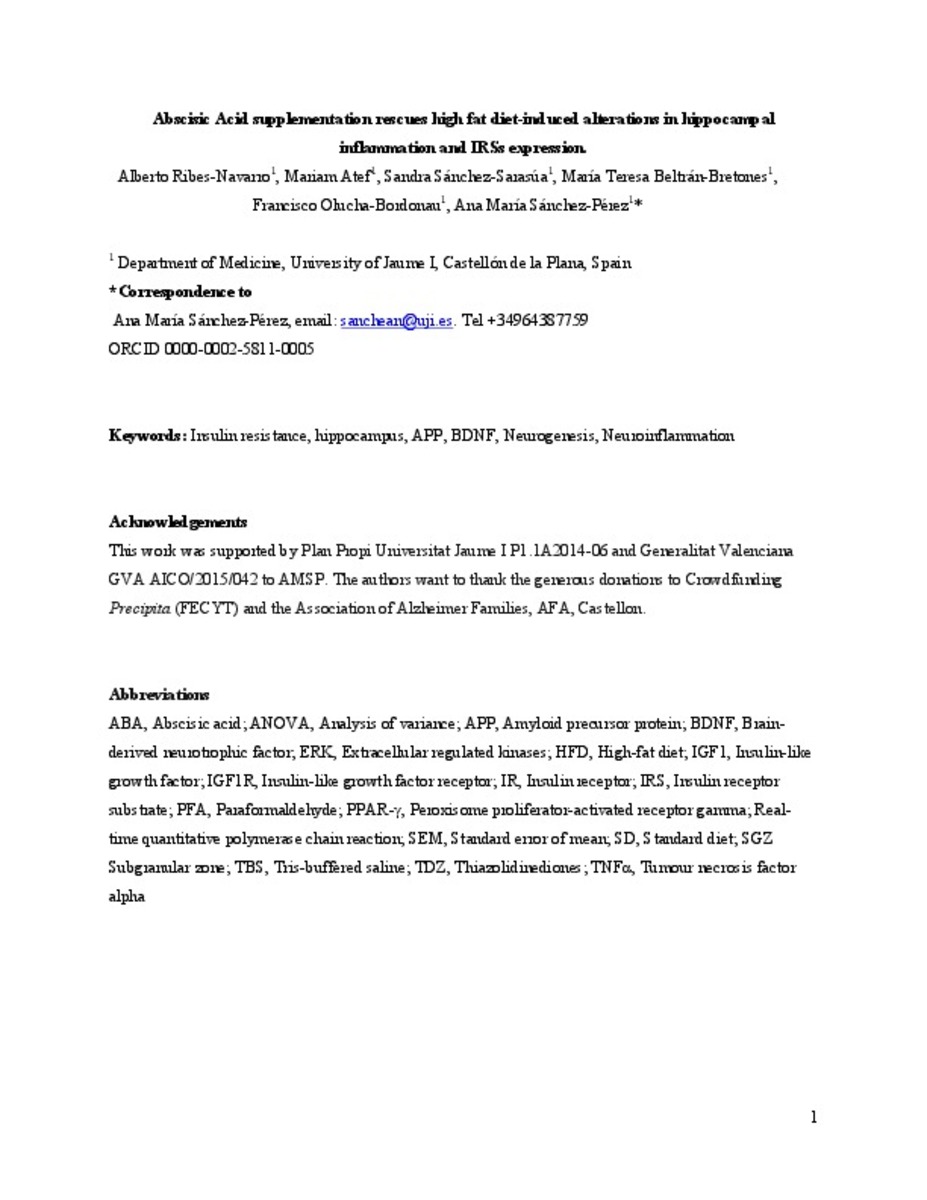Mostrar el registro sencillo del ítem
Abscisic Acid Supplementation Rescues High Fat Diet-Induced Alterations in Hippocampal Inflammation and IRSs Expression
| dc.contributor.author | Ribes-Navarro, Alberto | |
| dc.contributor.author | Atef, Mariam | |
| dc.contributor.author | Sánchez-Sarasúa, Sandra | |
| dc.contributor.author | Beltrán Bretones, María Teresa | |
| dc.contributor.author | Olucha-Bordonau, Francisco E | |
| dc.contributor.author | Sánchez-Pérez, Ana María | |
| dc.date.accessioned | 2018-06-18T10:05:30Z | |
| dc.date.available | 2018-06-18T10:05:30Z | |
| dc.date.issued | 2018 | |
| dc.identifier.citation | Ribes-Navarro, A., Atef, M., Sánchez-Sarasúa, S. et al. Mol Neurobiol (2018). https://doi.org/10.1007/s12035-018-1091-z | ca_CA |
| dc.identifier.issn | 0893-7648 | |
| dc.identifier.issn | 1559-1182 | |
| dc.identifier.uri | http://hdl.handle.net/10234/175242 | |
| dc.description.abstract | Accumulated evidence indicates that neuroinflammation induces insulin resistance in the brain. Moreover, both processes are intimately linked to neurodegenerative disorders, including Alzheimer’s disease. Potential mechanisms underlying insulin resistance include serine phosphorylation of the insulin receptor substrate (IRS) or insulin receptor (IR) misallocation. However, only a few studies have focused on IRS expression in the brain and its modulation in neuroinflammatory processes. This study used the high-fat diet (HFD) model of neuroinflammation to study the alterations of IR, an insulin-like growth factor receptor (IGF1R) and IRS expressions in the hippocampus. We observed that HFD effectively reduced mRNA and protein IRS2 expression. In contrast, a HFD induced the upregulation of the IRS1 mRNA levels, but did not alter an IR and IGF1R expression. As expected, we observed that a HFD increased hippocampal tumor necrosis factor alpha (TNFα) and amyloid precursor protein (APP) levels while reducing brain-derived neurotrophic factor (BDNF) expression and neurogenesis. Interestingly, we found that TNFα correlated positively with IRS1 and negatively with IRS2, whereas APP levels correlated positively only with IRS1 but not IRS2. These results indicate that IRS1 and IRS2 hippocampal expression can be affected differently by HFD-induced neuroinflammation. In addition, we aimed to establish whether abscisic acid (ABA) can rescue hippocampal IRS1 and IRS2 expression, as we had previously shown that ABA supplementation prevents memory impairments and improves neuroinflammation induced by a HFD. In this study, ABA restored HFD-induced hippocampal alterations, including IRS1 and IRS2 expression, TNFα, APP, and BDNF levels and neurogenesis. In conclusion, this study highlights different regulations of hippocampal IRS1 and IRS2 expression using a HFD, indicating the important differences of these scaffolding proteins, and strongly supports ABA therapeutic effects. | ca_CA |
| dc.format.extent | 18 p. | ca_CA |
| dc.format.mimetype | application/pdf | ca_CA |
| dc.language.iso | eng | ca_CA |
| dc.publisher | Springer | ca_CA |
| dc.relation.isPartOf | Molecular Neurobiology (2018) | ca_CA |
| dc.rights | “This is a post-peer-review, pre-copyedit version of an article published in MOLECULAR NEUROBIOLOGY. The final authenticated version is available online at: https://doi.org/10.1007/s12035-018-1091-z”. | ca_CA |
| dc.rights.uri | http://rightsstatements.org/vocab/InC/1.0/ | * |
| dc.subject | Insulin resistance | ca_CA |
| dc.subject | Hippocampus | ca_CA |
| dc.subject | APP | ca_CA |
| dc.subject | BDNF | ca_CA |
| dc.subject | Neurogenesis | ca_CA |
| dc.subject | Neuroinflammation | ca_CA |
| dc.title | Abscisic Acid Supplementation Rescues High Fat Diet-Induced Alterations in Hippocampal Inflammation and IRSs Expression | ca_CA |
| dc.type | info:eu-repo/semantics/article | ca_CA |
| dc.identifier.doi | https://doi.org/10.1007/s12035-018-1091-z | |
| dc.relation.projectID | P1.1A2014-06 ; GVA AICO/2015/042 | ca_CA |
| dc.rights.accessRights | info:eu-repo/semantics/openAccess | ca_CA |
| dc.relation.publisherVersion | https://link.springer.com/article/10.1007/s12035-018-1091-z | ca_CA |
| dc.date.embargoEndDate | 2019-05-31 | |
| dc.type.version | info:eu-repo/semantics/acceptedVersion | ca_CA |
Ficheros en el ítem
Este ítem aparece en la(s) siguiente(s) colección(ones)
-
MED_Articles [671]
Articles de publicacions periòdiques







